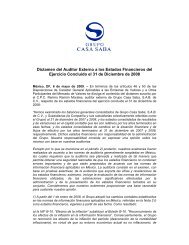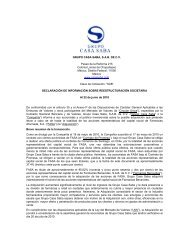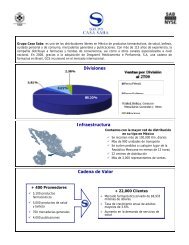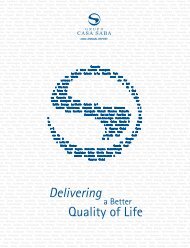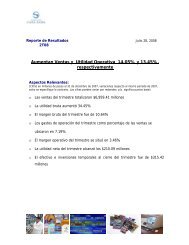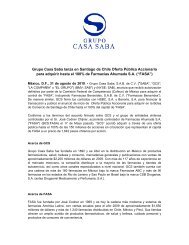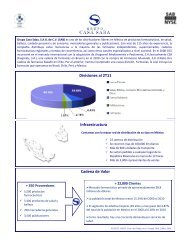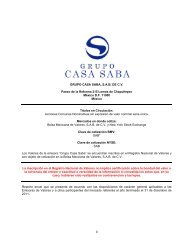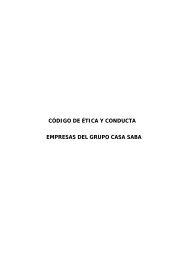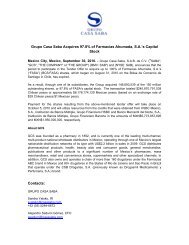FORM 20-F Grupo Casa Saba, S.A.B. de C.V.
FORM 20-F Grupo Casa Saba, S.A.B. de C.V.
FORM 20-F Grupo Casa Saba, S.A.B. de C.V.
Create successful ePaper yourself
Turn your PDF publications into a flip-book with our unique Google optimized e-Paper software.
Table of Contents<br />
Business combinations<br />
IFRS 1 allows IFRS 3, “Business combinations” (IFRS 3) to be applied prospectively, as of the transition date or from a specific date prior to the transition date.<br />
The Company will apply IFRS 3 prospectively to business combinations that occur as of the transition date. Therefore, the business combinations agreed upon prior to the transition<br />
date will not be reestablished. Consequently, the goodwill balance <strong>de</strong>termined in accordance with prior GAAP at the transition date was not affected by the migration. Consequently,<br />
the carrying amount of the assets acquired and liabilities assumed in the business combination will be their attributed cost, in accordance with IFRS on that date.<br />
Tax criteria<br />
Un<strong>de</strong>r Mexican FRS, the tax effect related to the adoption of a tax criterion is <strong>de</strong>termined in accordance with a mo<strong>de</strong>l of likelihoods; therefore, an entity is not required to record a tax<br />
liability, unless a disbursement of economic resources is likely or when the obligation can be estimated reasonably.<br />
In accordance with IFRS, that effect is recognized un<strong>de</strong>r the confi<strong>de</strong>nce level that a tax position acquires or expects to acquire. Therefore, the tax effect of a position should be<br />
recognized only if it meets the “more likely than not” standard limit to be admitted based on its technical merits (laws, regulations, rules, etc.). Toward this end, the entities assume that<br />
the tax authorities will examine and they will have all the relevant information for each position. If a tax position is not consi<strong>de</strong>red as “more likely than not”, no benefit of the position<br />
will be recognized in the financial statements.<br />
Management is about to <strong>de</strong>termine if there are effects associated with uncertain tax liabilities that might result in the recognition of a provision in its opening statement of financial<br />
position un<strong>de</strong>r IFRS, which it will apply against the opening balance of retained earnings.<br />
Impact of inflation<br />
In accordance with Mexican FRS B-10, the impact of inflation is recognized when the economic environment of the entity is inflationary (inflation equal to or above 26 percent<br />
accumulated in the three annual prior fiscal years). IAS 29, “Financial Reporting in Hyperinflationary Economy” an economy is hyperinflationary when inflation in that period<br />
approximates or exceeds 100 percent.<br />
The last hyperinflationary period for Mexico was 1997 (Brazilian and Chilean operations were acquired in <strong>20</strong>08 and <strong>20</strong>10, respectively). Accordingly, the Company will eliminate the<br />
impact of inflation previously recor<strong>de</strong>d in Mexico for the period of 1998 up to December 31, <strong>20</strong>07.<br />
b) Exceptions to the retroactive application of other IFRS<br />
Estimates<br />
The estimates in accordance with IFRS at the transition date will be congruent with those carried out for the same date according to prior GAAP (after making the necessary adjustments<br />
to reflect any difference in accounting policies), unless there is evi<strong>de</strong>nce that these estimates were erroneous. The Company will review its estimates at the transition date; however, it<br />
estimates that there will be no changes to the estimates ma<strong>de</strong> previously.<br />
F-54



